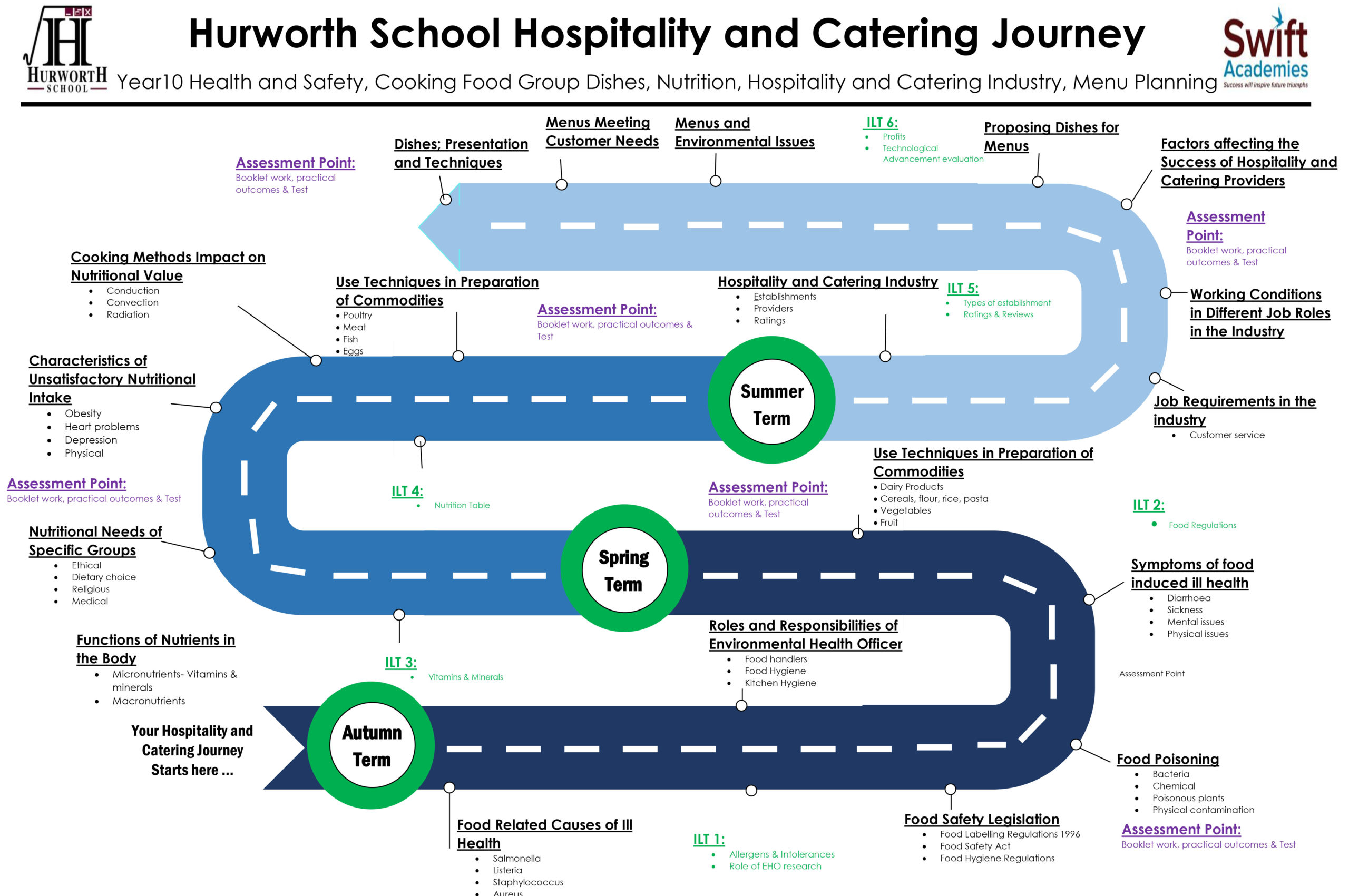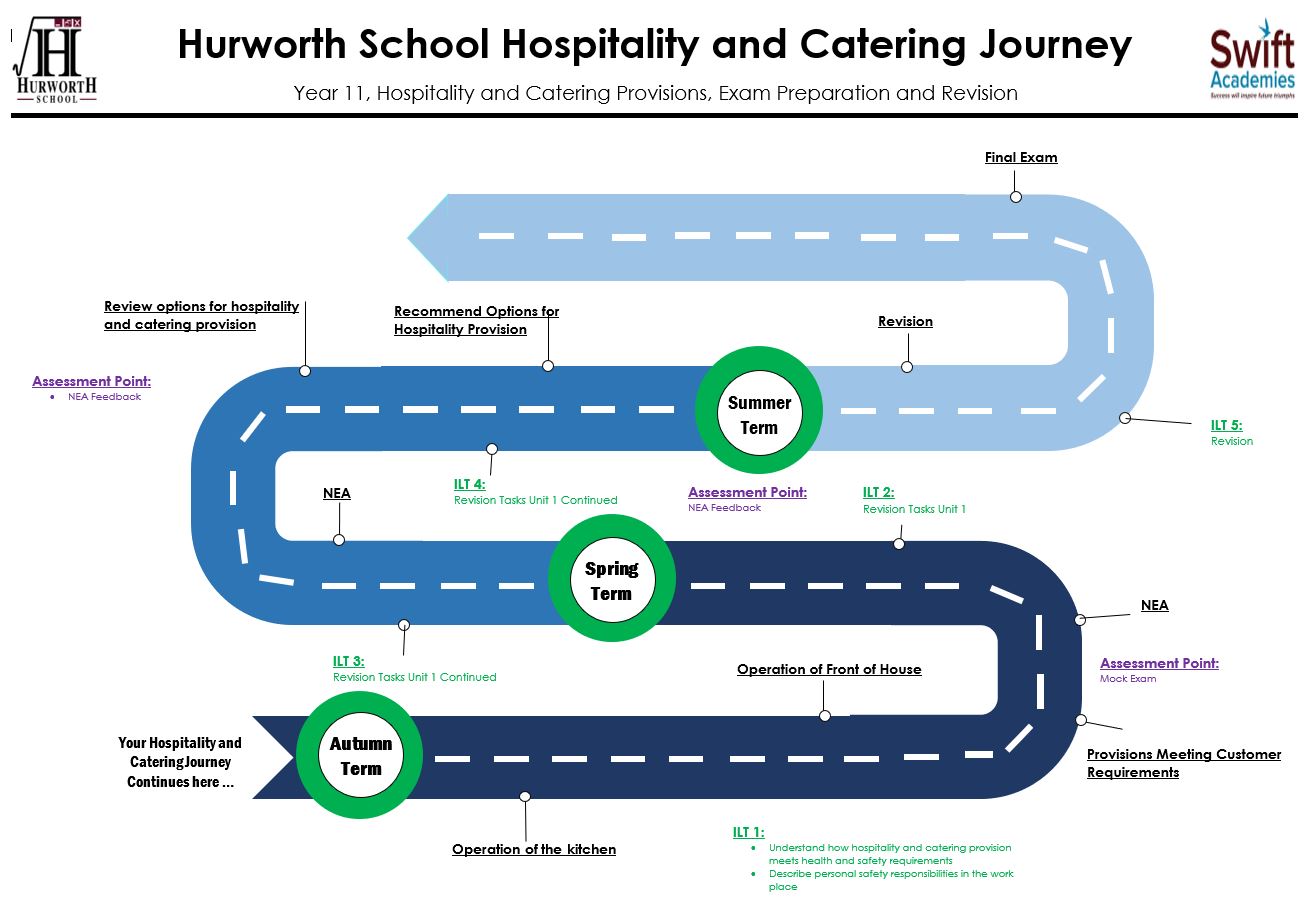Why do we study Food?
Students in Year 7 will begin with the basics of food safety and hygiene. They will learn how to safely use equipment in the kitchen areas and produce food products that are designed to give them basic cooking skills, which are then built upon throughout their time at Hurworth.
The second project in Year 7 will see student’s further progress with more complex practical lessons. They will also explore the journey different commodities take from farm to fork. This project offers a good foundation into knowledge of nutrition and healthy eating as well as building on and expanding their preparation and cooking skills.
Our curriculum focuses on allowing students to understand and apply the principles of nutrition and learn how to cook, giving them key life skills.
Year 7
Learning Outcomes
Students will complete a wide range of dishes across the term, introducing them to key food concepts such as cutting, preparing, baking, frying, boiling, through a range of food outcomes including fruit smoothies, flap jacks, cakes, and soups. These skills will give them the building blocks create slightly more complex dishes, including fruit crumble, pasta dishes, bread, scones and muffins. They will learn how to work with different equipment and maintain a safe working environment.
Students will be introduced to the correct knife skills to use, including the claw and bridge grip.
Topics Taught
Health and Safety/Hygiene
- Health and safety rules
- Introduction to kitchen equipment
- Healthy eating/ the Eat Well Plate
- Different cooking methods
All about food
- How to weigh and measure accurately
- Product analysis
- Seasonality
- Farm to fork
- Costing and budgeting
- Evaluating

DT – KS3 – Read and watch list
Year 8
Learning Outcomes
Students will complete a more extensive range of food dishes across the term, the first project undertaken in Year 8 explores nutrition and how our body uses food as fuel. They will study Carbohydrates, Proteins, Fats and Micronutrients as well as learning the importance of energy balance. This is proceeded by a variety of practical lessons that will help develop their skills and confidence in the kitchen.
Year 8 students will then proceed to experience multi-cultural food. As the UK is a multi-cultural country, it is important that students are aware of food practices and cuisines in other countries and cultures besides their own. During this project they will take part in tasting lessons, experiencing new food and tastes from around the world. They will also gain knowledge on religions and factors as to why countries and cultures have such differing food. Finally, they will learn to prepare and cook authentic multi-cultural dishes before researching a country and designing and making their own dish. These may include chicken chow mein, baby carrot cakes, pizza wheels, chicken and bacon pasta, cheesecake, spaghetti bolognaise, fajitas, kofta and pitta breads and chocolate mousse.
Topics Taught
Skills for life
- Safe working practice and hygiene in industry
- Energy
- Carbohydrates, their functions and sources
- Proteins, their functions and sources
- Fats, their functions and sources
- Micronutrients and Diary
Multi-cultural food
- Food and religion
- Special diets and adaptation/ diets from around the world
- Multi cooking and preparation methods
- Food presentation

DT – KS3 – Read and watch list
Year 9
Learning Outcomes
The first project explores nutrition, focussing on the different macronutrients and what their functions are in the body. This will centre on a theme of fast food where the students will learn to make healthy homemade versions of their favourite fast food dishes such as McDonalds, Pizza, KFC and Kebabs. Students will also complete an independent extended project of their choice at the end of the unit. Student’s will cook a variety of dishes during this project, including chicken burger, cookies, and independent recipes.
Project 2 will see the students studying in more depth the scientific reactions of food in baking, looking at the science behind such aspects as gelatinisation. They will complete a wide range of baked products from breads to pastries and cakes. Here they will explore the roles of specific ingredients and how they react with each other in order to create the perfect final outcome. They will also conduct experiments with alternative ingredients to observe the effects, giving them a greater understanding of ingredients and their properties.
Topics Taught – Pupils study Food for 1 term in Year 9 and rotate on a carousel
Fast-food
- Macronutrients
- Proteins
- Gelatinisation
- Fats
- Sugars
- Nutritional labels
- Fast food Recipe/ Dish development for a target audience
Bake off
- Flour
- Reduce, recycle reuse
- Ingredients, and their functional and chemical properties
- Pastry
- Factors which effect food choices
Bake off Recipe/ dish development

DT – KS3 – Read and watch list
LEVEL 1 & 2 HOSPITALITY AND CATERING
Year 10
Exam Specification
Level 1 & 2 Hospitality and Catering
WJEC Specification
Learning Outcomes
The Year 10 course will initially focus on where food comes from and understanding the functional and nutritional properties of food. Students will develop their cooking skills through practical work and experimentation.
Topics Taught
Autumn Term
Unit 1 – LO 4
Know how food can cause ill health
- Describe food related causes of ill health
- Describe the role and responsibilities of the environmental health officer (EHO)
- Describe Food Safety legislation
- Describe common types of food poisoning
- Describe the symptoms of food induced ill health
Unit 2 – LO3
Be able to cook dishes
Use techniques in preparation of commodities
- Dairy products
- Cereals, flour, rice, pasta
- Vegetables
- Fruit
Spring Term
LO1
Understand the importance of nutrition when planning menus
- Describe functions of nutrients in the human body
- Compare nutritional needs of specific groups
- Explain characteristics of unsatisfactory nutritional intake
- Explain how cooking methods impact on nutritional value
LO3
Be able to cook dishes
Use techniques in preparation of commodities
- Poultry
- Meat
- Fish
- Eggs
Summer Term
LO1
Understand the environment in which hospitality and catering providers operate
- Describe the structure of the hospitality and catering industry
- Analyse job requirements within the hospitality and Catering industry
- Describe working conditions of different job roles across the hospitality and catering industry
- Explain factors affecting the success of hospitality and catering providers
LO2
Understand menu planning
- Explain factors to consider when proposing dishes for menus
- Explain how dishes on a menu address environmental issues
- Explain how menu dishes meet customer needs
- Complete dishes using presentation techniques

DT – KS4 – Read and watch list
Year 11
Exam Specification
Level 1 & 2 Hospitality and Catering
WJEC Specification
Learning Outcomes
In Year 11, students will develop their understanding of how hospitality and catering provision operates in real life contexts to meet customer requirements and achieve success. They will also learn how to recommend and review provisions, a skill that is used in industry. Lastly, they will revise for their final assessment/ exam.
Topics Taught
Autumn Term
LO2
Understand how hospitality and catering provision operates
- Describe the operation of the kitchen
- Describe the operation of front of house
- Explain how hospitality and catering provision meets customer requirements
NEA
Spring Term
LO5
Be able to propose a hospitality and catering provision to meet specific requirements
- Review options for hospitality and catering provision
NEA
Recommend options for hospitality provision
Summer Term
Revision




